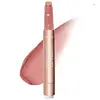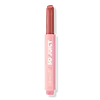What's inside
What's inside
 Key Ingredients
Key Ingredients

 Benefits
Benefits

 Concerns
Concerns

 Ingredients Side-by-side
Ingredients Side-by-side

Phytosteryl/Isostearyl/Cetyl/Stearyl/Behenyl Dimer Dilinoleate
Skin ConditioningDiisostearyl Malate
EmollientBis-Diglyceryl Polyacyladipate-2
EmollientPolyglyceryl-2 Triisostearate
EmulsifyingHydrogenated Polyisobutene
EmollientCeresin
Emulsion StabilisingMenthone Glycerin Acetal
RefreshingMicrocrystalline Wax
Emulsion StabilisingPassiflora Edulis Seed Oil
EmollientPassiflora Incarnata Fruit Extract
Skin ConditioningVitis Vinifera Seed Oil
EmollientAroma
Citrullus Lanatus Fruit Extract
Skin ConditioningCitrus Limon Fruit Extract
MaskingEuterpe Oleracea Fruit Extract
Fragaria Vesca Fruit Extract
AstringentLycium Barbarum Fruit Extract
AstringentMalpighia Punicifolia Fruit Extract
AntioxidantPrunus Persica Fruit Extract
AbrasivePunica Granatum Fruit Extract
AntioxidantVaccinium Angustifolium Fruit Extract
Skin ProtectingVaccinium Macrocarpon Fruit Extract
AstringentTocopherol
Antioxidant1,2-Hexanediol
Skin ConditioningEthylhexyl Palmitate
EmollientTrihydroxystearin
Skin ConditioningSodium Hyaluronate
HumectantBenzyl Benzoate
AntimicrobialTocopheryl Acetate
AntioxidantBenzyl Alcohol
PerfumingTitanium Dioxide
Cosmetic ColorantCI 77491
Cosmetic ColorantCI 77492
Cosmetic ColorantCI 77499
Cosmetic ColorantCI 15850
Cosmetic ColorantCI 15985
Cosmetic ColorantCI 19140
Cosmetic ColorantCI 45410
Cosmetic ColorantPhytosteryl/Isostearyl/Cetyl/Stearyl/Behenyl Dimer Dilinoleate, Diisostearyl Malate, Bis-Diglyceryl Polyacyladipate-2, Polyglyceryl-2 Triisostearate, Hydrogenated Polyisobutene, Ceresin, Menthone Glycerin Acetal, Microcrystalline Wax, Passiflora Edulis Seed Oil, Passiflora Incarnata Fruit Extract, Vitis Vinifera Seed Oil, Aroma, Citrullus Lanatus Fruit Extract, Citrus Limon Fruit Extract, Euterpe Oleracea Fruit Extract, Fragaria Vesca Fruit Extract, Lycium Barbarum Fruit Extract, Malpighia Punicifolia Fruit Extract, Prunus Persica Fruit Extract, Punica Granatum Fruit Extract, Vaccinium Angustifolium Fruit Extract, Vaccinium Macrocarpon Fruit Extract, Tocopherol, 1,2-Hexanediol, Ethylhexyl Palmitate, Trihydroxystearin, Sodium Hyaluronate, Benzyl Benzoate, Tocopheryl Acetate, Benzyl Alcohol, Titanium Dioxide, CI 77491, CI 77492, CI 77499, CI 15850, CI 15985, CI 19140, CI 45410
Diisostearyl Malate
EmollientPhytosteryl/Isostearyl/Cetyl/Stearyl/Behenyl Dimer Dilinoleate
Skin ConditioningBis-Diglyceryl Polyacyladipate-2
EmollientPolyglyceryl-2 Triisostearate
EmulsifyingHydrogenated Polyisobutene
EmollientCeresin
Emulsion StabilisingPolyethylene
AbrasiveC12-15 Alkyl Benzoate
AntimicrobialRicinus Communis Seed Oil
MaskingMenthone Glycerin Acetal
RefreshingAlumina
AbrasiveMicrocrystalline Wax
Emulsion StabilisingAroma
Sodium Hyaluronate
HumectantCaprylic/Capric Triglyceride
MaskingTribehenin
EmollientPhenoxyethanol
PreservativeTocopheryl Acetate
AntioxidantCaprylyl Glycol
EmollientDiethylhexyl Syringylidenemalonate
Skin ProtectingHelianthus Annuus Seed Wax
Skin ConditioningCeramide Ng
Skin ConditioningPEG-10 Phytosterol
EmulsifyingEthylhexylglycerin
Skin ConditioningHexylene Glycol
EmulsifyingTocopherol
AntioxidantZingiber Officinale Root Extract
MaskingTriethoxycaprylylsilane
Astrocaryum Tucuma Seed Butter
EmollientPalmitoyl Hexapeptide-12
Skin ConditioningSilica
AbrasiveIron Oxides
CI 15850
Cosmetic ColorantCI 16035
Cosmetic ColorantCI 77891
Cosmetic ColorantDiisostearyl Malate, Phytosteryl/Isostearyl/Cetyl/Stearyl/Behenyl Dimer Dilinoleate, Bis-Diglyceryl Polyacyladipate-2, Polyglyceryl-2 Triisostearate, Hydrogenated Polyisobutene, Ceresin, Polyethylene, C12-15 Alkyl Benzoate, Ricinus Communis Seed Oil, Menthone Glycerin Acetal, Alumina, Microcrystalline Wax, Aroma, Sodium Hyaluronate, Caprylic/Capric Triglyceride, Tribehenin, Phenoxyethanol, Tocopheryl Acetate, Caprylyl Glycol, Diethylhexyl Syringylidenemalonate, Helianthus Annuus Seed Wax, Ceramide Ng, PEG-10 Phytosterol, Ethylhexylglycerin, Hexylene Glycol, Tocopherol, Zingiber Officinale Root Extract, Triethoxycaprylylsilane, Astrocaryum Tucuma Seed Butter, Palmitoyl Hexapeptide-12, Silica, Iron Oxides, CI 15850, CI 16035, CI 77891
 Reviews
Reviews

Ingredients Explained
These ingredients are found in both products.
Ingredients higher up in an ingredient list are typically present in a larger amount.
Aroma refers to an ingredient, or mixture of ingredients, that impart or mask a flavor.
The name is slightly confusing. This is because INCI associates aroma with flavor instead of smell.
Here is the official definition from the The International Cosmetic Ingredient Dictionary and Handbook:
“Aroma is a term for ingredient labeling used to identify that a product contains a material or combination of materials normally added to a cosmetic to produce or to mask a particular flavor.”
INCI shows the only purpose of aroma to be "flavouring".
However, due to regulation differences, some companies may use aroma in place of parfum.
In Canada, this ingredient only has to be listed in concentrations above 1%.
Learn more about AromaThis ingredient is lipid-based synthetic skin-conditioning agent derived from adipic acid and a mixture of fatty acids. It is often called a lanolin substitute.
As an emollient, it helps soften and hydrate the skin. Emollients create a barrier on the skin to trap moisture in.
Due to its fatty acid base, it may not be Malassezia folliculitis safe.
Learn more about Bis-Diglyceryl Polyacyladipate-2Ceresin is a wax derived from ozokerite. It is an alternative to beeswax.
The most common process of creating ceresin is by using heat and sulfuric acid.
Ci 15850 is the pigment color red. It is an azo dye and created synthetically.
Azo dyes need to be thoroughly purified before use. This allows them to be more stable and longer-lasting.
This ingredient is common in foundations, lipsticks, and blushes. This color is described as brown/orangey red.
It has many secondary names such as Red 6 and Red 7. According to a manufacturer, Red 6 usually contains aluminum.
Learn more about CI 15850Diisostearyl Malate is an emollient and most often used in lip products. It comes from isostearyl alcohol, a fatty acid, and malic acid, an AHA.
As an emollient, Diisostearyl Malate helps create a thin film on your skin to trap moisture in. This helps keep your skin soft and smooth.
Hydrogenated Polyisobutene is a synthetic polymer. Polymers are compounds with high molecular weight. Hydrogenated Polyisobutene is an emollient and texture enhancer.
In one study, Hydrogenated Polyisobutene showed better skin hydration levels than Caprylic/Capric Triglyceride. As an emollient, it helps keep your skin soft and hydrated by trapping moisture in.
Hydrogenated Polyisobutene is often used as a mineral oil replacement.
Learn more about Hydrogenated PolyisobuteneWe don't have a description for Menthone Glycerin Acetal yet.
Microcrystalline Wax is created by de-oiling petroleum. It is highly refined and purified before being added to cosmetics.
Microcrystalline Wax is used to enhance the texture and create even consistency. It helps stabilize a product by preventing ingredients from separating.
We don't have a description for Phytosteryl/Isostearyl/Cetyl/Stearyl/Behenyl Dimer Dilinoleate yet.
This ingredient is a form of glycerin with emulsifying and emollient properties.
As an emulsifier, this ingredient helps keep products together while adding a thick texture. The manufacturer states this ingredient has emollient properties. Emollients help keep the skin hydrated by trapping moisture in.
Polyglyceryl-2 Triisostearate is created by reacting diglycerin and isostearic acid. Due to the isostearic acid base, it may not be safe for Malassezia or fungal acne.
Learn more about Polyglyceryl-2 TriisostearateSodium Hyaluronate is hyaluronic acid's salt form. It is commonly derived from the sodium salt of hyaluronic acid.
Like hyaluronic acid, it is great at holding water and acts as a humectant. This makes it a great skin hydrating ingredient.
Sodium Hyaluronate is naturally occurring in our bodies and is mostly found in eye fluid and joints.
These are some other common types of Hyaluronic Acid:
Learn more about Sodium HyaluronateTocopherol (also known as Vitamin E) is a common antioxidant used to help protect the skin from free-radicals and strengthen the skin barrier. It's also fat soluble - this means our skin is great at absorbing it.
Vitamin E also helps keep your natural skin lipids healthy. Your lipid skin barrier naturally consists of lipids, ceramides, and fatty acids. Vitamin E offers extra protection for your skin’s lipid barrier, keeping your skin healthy and nourished.
Another benefit is a bit of UV protection. Vitamin E helps reduce the damage caused by UVB rays. (It should not replace your sunscreen). Combining it with Vitamin C can decrease sunburned cells and hyperpigmentation after UV exposure.
You might have noticed Vitamin E + C often paired together. This is because it is great at stabilizing Vitamin C. Using the two together helps increase the effectiveness of both ingredients.
There are often claims that Vitamin E can reduce/prevent scarring, but these claims haven't been confirmed by scientific research.
Learn more about TocopherolTocopheryl Acetate is AKA Vitamin E. It is an antioxidant and protects your skin from free radicals. Free radicals damage the skin by breaking down collagen.
One study found using Tocopheryl Acetate with Vitamin C decreased the number of sunburned cells.
Tocopheryl Acetate is commonly found in both skincare and dietary supplements.
Learn more about Tocopheryl Acetate